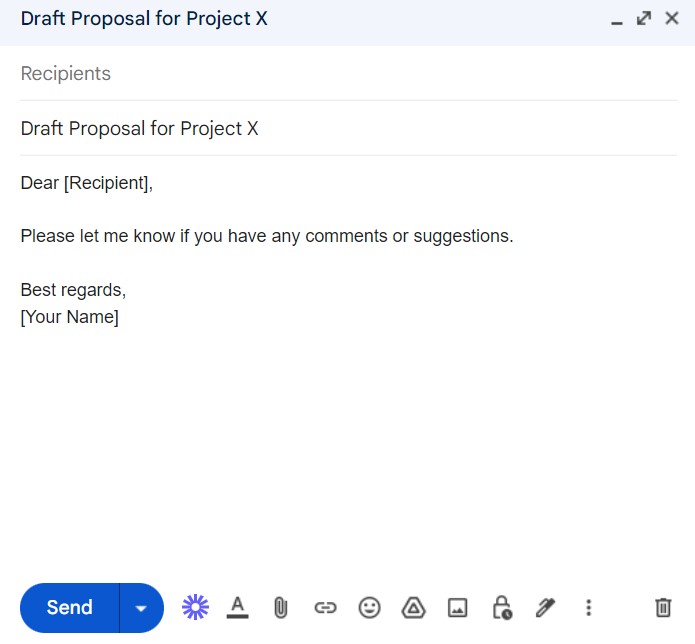In professional settings, we often seek feedback and collaboration from colleagues.
One way to encourage this is by using phrases like “Please let me know if you have any comments.”
In this article, we will discuss how to use this phrase in an email, when to use it, and provide ten examples.
Additionally, we will explore alternative ways to express the same sentiment.
Contents
- How to Use “Please Let Me Know if You Have Any Comments” in an Email
- “Please Let Me Know if You Have Any Comments” Email Examples
- Example 1 – Subject: Draft Proposal for Project X
- Example 2 – Subject: Meeting Agenda for April 10
- Example 3 – Subject: Updated Policy Document
- Example 4 – Subject: Design Mockups for Client Presentation
- Example 5 – Subject: Employee Performance Review Template
- Example 6 – Subject: New Website Content
- Example 7 – Subject: Budget Proposal for Fiscal Year 2024
- Example 8 – Subject: Office Relocation Plan
- Example 9 – Subject: Social Media Strategy for Q2
- Example 10 – Subject: Internal Training Program Outline
- Alternative Ways to Say “Please Let Me Know if You Have Any Comments” in an Email
How to Use “Please Let Me Know if You Have Any Comments” in an Email
Using the phrase “Please let me know if you have any comments” is an effective way to invite feedback and show that you value others’ opinions.
This phrase is best used when you want to keep the tone polite and professional.
In the following section, we will look at various examples to demonstrate how to use this phrase in different contexts.
“Please Let Me Know if You Have Any Comments” Email Examples
Example 1 – Subject: Draft Proposal for Project X
Dear [Recipient],
Please let me know if you have any comments or suggestions.
Best regards,
[Your Name]
Example 2 – Subject: Meeting Agenda for April 10
Dear [Recipient],
Please let me know if you have any comments or additional items to include.
Kind regards,
[Your Name]
Example 3 – Subject: Updated Policy Document
Dear [Recipient],
Please let me know if you have any comments or concerns.
Sincerely,
[Your Name]
Example 4 – Subject: Design Mockups for Client Presentation
Dear [Recipient],
Please let me know if you have any comments before we submit these to the client.
Warm regards,
[Your Name]
Example 5 – Subject: Employee Performance Review Template
Dear [Recipient],
Please let me know if you have any comments regarding the template.
Best wishes,
[Your Name]
Example 6 – Subject: New Website Content
Dear [Recipient],
Please let me know if you have any comments on the proposed content.
Yours sincerely,
[Your Name]
Example 7 – Subject: Budget Proposal for Fiscal Year 2024
Dear [Recipient],
Please let me know if you have any comments or questions.
Best regards,
[Your Name]
Example 8 – Subject: Office Relocation Plan
Dear [Recipient],
Please let me know if you have any comments or concerns about the relocation.
Kind regards,
[Your Name]
Example 9 – Subject: Social Media Strategy for Q2
Dear [Recipient],
Please let me know if you have any comments on our strategy.
Sincerely,
[Your Name]
Example 10 – Subject: Internal Training Program Outline
Dear [Recipient],
Please let me know if you have any comments or suggestions for improvement.
Warm regards,
[Your Name]
Alternative Ways to Say “Please Let Me Know if You Have Any Comments” in an Email
In this section, we will explore alternative phrases to express the same sentiment as “Please let me know if you have any comments.”
These alternatives can be useful to keep your communication fresh and engaging.
- I’d appreciate your feedback or thoughts on this.
- Feel free to share your comments or suggestions.
- If you have any input or ideas, please don’t hesitate to let me know.
- I’m open to any comments or recommendations you may have.
- Your feedback would be greatly valued.
Using the phrase “Please let me know if you have any comments” and its alternatives can foster a collaborative environment and ensure that your colleagues feel valued.
By incorporating these phrases into your email communication, you can effectively invite feedback and demonstrate your professionalism.


